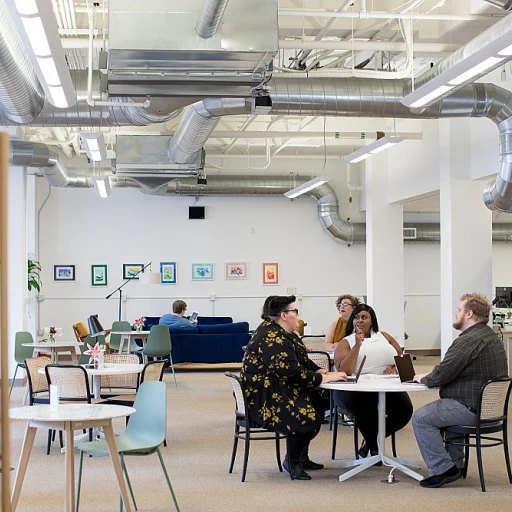
Understanding Leadership Development Commodities
Defining the Landscape of Leadership Development Commodities
In today's fast-paced business environment, leadership development has become a crucial component for organizational success. Companies are increasingly investing in leadership development commodities to cultivate effective leaders who can navigate complex challenges and drive growth. But what exactly are these commodities, and how do they contribute to leadership growth?
Leadership development commodities encompass a wide range of products and services designed to enhance leadership skills and capabilities. These include training programs, workshops, coaching sessions, and digital resources that equip leaders with the necessary tools to excel in their roles. The goal is to create a robust pipeline of leaders who can adapt to changing market dynamics and steer their organizations towards success.
The Role of Industry Giants in Leadership Development
Companies like the Louis Dreyfus Company (LDC) play a significant role in shaping the landscape of leadership development. Known for its extensive range of services in commodity trading, including agricultural products like grains, oilseeds, and coffee, LDC is not only a leader in global trading but also in fostering leadership within its ranks. By integrating leadership development into their business strategy, they ensure that their senior management and supervisory board are well-equipped to handle the complexities of the global market.
Moreover, the company's focus on risk management and supply chain logistics highlights the importance of strategic leadership in maintaining a competitive edge. As leaders in the food and beverage industry, including products like instant coffee and sugar, LDC's commitment to leadership development is evident in their approach to nurturing talent and fostering innovation.
Exploring the Impact of Leadership Development Commodities
The impact of leadership development commodities extends beyond individual growth. By investing in these resources, organizations can enhance their overall performance and resilience. This is particularly important in industries like commodity trading, where market fluctuations and global challenges require agile and forward-thinking leaders.
For those seeking to master the role of a seminar leader or explore innovative approaches to leadership training, understanding the value of leadership development commodities is essential. These resources not only provide the skills needed for effective leadership but also foster a culture of continuous learning and improvement.
Key Skills in Leadership Development
Essential Qualities for Effective Leadership
Leadership development is critical in fostering the skills necessary to navigate the complexities of today’s global market, where industries like those managed by Dreyfus Commodities are engaged in commodity trading. Successful leadership doesn't just happen overnight; it involves cultivating a range of skills that are central to navigating and managing positions effectively in companies such as LDC or in sectors like food and beverage, grains and oilseeds, and renewable energy. One of the primary skills emphasized in this space is strategic thinking. Leaders are required to foresee market trends in commodities such as sugar, coffee, and agricultural products. Companies like the Dreyfus Company hinge their operations on the ability of their leaders to predict and respond effectively to changes in the global trade markets. Additionally, communication skills are essential. In trading, services, and logistical operations, clear communication can enhance team efficiency, thereby impacting the supply chain positively. This ties into the need for robust risk management strategies, which leaders must develop to address uncertainties inherent in commodities and agricultural ventures. Organizations like Louis Dreyfus Holding stress on their senior management to enhance these skills continually. The supervisory board often emphasizes leadership training that focuses on adaptive problem-solving and decision-making strategies, which are paramount in maintaining business activities such as those found in key pillars like instant coffee and coffee cotton industries. This practical knowledge is paired with the ability to implement operational improvements across a company’s products and services. For instance, in the realm of agricultural markets, effective leaders ensure that feedback mechanisms are in place, concurrently fostering an environment where innovation can thrive. Creating and sustaining such an innovative culture relies heavily on transformational leadership. The business environment, including logistics and the trading market, also demands leaders proficient in negotiation. Superior negotiation skills can mean the difference between sealing critical deals in commodities llc or missing significant opportunities in global markets. Effective leaders in these scenarios often hold responsibility for management jobs that drive impactful business transformations. For those looking to further sharpen their leadership skills, engaging in dedicated events such as the Premier Restaurant Leadership Conference can offer valuable insights and networking opportunities, positioning them to better perform and adapt in dynamic fields. By honing these key skills, leaders can significantly influence the trajectory of organizations and adapt to the ever-evolving demands of international markets, thus playing a pivotal role in shaping sustainable business futures.Challenges in Leadership Development
Overcoming Barriers in Leadership Training
Leadership development is a crucial aspect of business growth, yet it faces numerous challenges that can hinder its effectiveness. Understanding these obstacles is essential for organizations aiming to cultivate strong leaders. One of the primary challenges is the rapidly changing global market, which demands leaders to be adaptable and forward-thinking. Companies like Louis Dreyfus Company (LDC) and other major players in commodity trading, such as Dreyfus Commodities, must ensure their leaders are equipped to handle the complexities of global trading and supply chain management.
Another significant challenge is the integration of diverse skills required in leadership roles. Leaders in sectors like agricultural products and food beverage industries must possess a broad range of competencies, from risk management to logistics. The dynamic nature of these industries, including the trading of grains oilseeds and coffee cotton, requires leaders to be not only knowledgeable but also innovative in their approach.
Moreover, the development of leadership skills often encounters resistance due to organizational culture and existing management structures. Senior management and supervisory boards may be hesitant to adopt new training methodologies or invest in leadership development programs. This resistance can be particularly pronounced in traditional sectors such as the sugar and instant coffee markets, where established practices dominate.
To address these challenges, organizations must prioritize continuous learning and development. This includes offering a range of services and products that cater to the evolving needs of their leaders. Companies like Imperial Sugar and other subsidiaries under Dreyfus Holding can benefit from tailored leadership programs that focus on both technical skills and soft skills, such as communication and emotional intelligence.
For those seeking to enhance their leadership capabilities, exploring essential courses a business coach should offer to clients can provide valuable insights into overcoming these barriers. By addressing these challenges head-on, organizations can foster a culture of leadership that is resilient, innovative, and prepared for the future.
Innovative Approaches to Leadership Training
Harnessing Innovation in Leadership Training
In the evolving landscape of leadership development, innovative approaches are gaining momentum, offering fresh perspectives and methods to cultivate leaders who are adaptable and forward-thinking. Businesses today, including those in commodity trading like Dreyfus Company, are exploring diverse strategies to enhance their leadership programs.- Blended Learning Models: Companies like Dreyfus Commodities often integrate traditional and digital learning tools to provide a comprehensive training experience. By combining in-person workshops with online modules, leaders can engage with materials at their own pace while benefiting from direct interaction with trainers and peers.
- Technology Integration: Utilizing technology in leadership development programs allows for interactive experiences and real-time feedback. For instance, simulations and virtual reality can be used to mimic real-world scenarios, such as risk management in global trading or logistics operations within agricultural supply chains.
- Role-specific Training: Tailoring leadership training to the specific needs of a role within an organization is crucial, particularly for companies that handle a wide range of products and services like LDC. This approach ensures that management is equipped to handle industry-specific challenges, whether related to coffee trading or logistics in agricultural products.
The Role of Mentorship in Leadership Growth
The Power and Influence of Mentorship
Mentorship plays an indispensable role in leadership growth, acting as a bridge between theoretical knowledge and practical application. The commodities landscape within the Louis Dreyfus Company (LDC), known for its wide array of products and services, such as food, sugar, and agricultural products, provides a fertile ground for mentorship. The mentors in these industries bring invaluable firsthand experiences from various facets of the business, including logistics, commodity trading, and risk management. Mentorship in sectors like grain, oilseeds, and coffee trading involves imparting not just the technical know-how but also the subtleties of global market dynamics. This guidance often involves seasoned mentors from the senior management or supervisory board, who can offer nuanced insights on navigating complexities. Furthermore, the comprehensive services offered by LDC, ranging from supply chain management to renewable energy initiatives, provide an expansive backdrop for mentoring opportunities. This breadth allows mentees to observe and absorb diverse strategic approaches. The dreyfus commodities and dreyfus holding divisions, in particular, serve as a rich training ground for emerging leaders striving for proficiency in a rapidly evolving market. Mentors, especially those involved in complex products like instant coffee or commodities llc, help in expanding the mentees' vision beyond immediate management jobs by inculcating a big-picture thinking approach. Such interactions often inspire innovative approaches to problem-solving, a necessary skill for effective leadership. To maximize the benefits of mentorship, it is crucial to foster an environment that encourages open communication and trust. A successful mentorship program ties back into understanding key skills in leadership development, underscoring the interconnectedness of mentorship with the broader leadership learning ecosystem.Measuring Success in Leadership Development
Evaluating Leadership Development Outcomes
Understanding the effectiveness of leadership development initiatives is crucial for businesses like Louis Dreyfus Company (LDC), known for their extensive footprint in commodity trading and agricultural products, including sugar and coffee. Evaluating success in leadership development involves assessing both individual and organizational performance improvements.- Assessment Metrics: Determine what success looks like in terms of increased efficiency, improved decision-making, and enhanced team dynamics. For a global trading organization, this could mean better risk management strategies or more efficient supply chain logistics.
- Feedback Mechanisms: Regular feedback loops can provide insights into how leadership programs are received and their real-world application. This involves gathering input from participants and their teams to identify improvements in management styles or supervisory boards.
- Skill Application: One must measure how effectively the acquired skills are applied in real-world business scenarios. For instance, after an intensive training module, does the senior management show improved capability in managing market volatility or leading commodity trading initiatives in grains, oilseeds, and other critical sectors?
- Progress Tracking: Establish benchmarks to track progress over time. This could include performance metrics like enhanced productivity in departments dealing with food and beverage products and services, or innovation in logistics and range services.
- Organizational Impact: Evaluate how training contributes to the broader company goals, such as LDC’s involvement in renewable energy and their branch into instant coffee and food supply chain improvements. Management successes in these areas can be direct indicators of leadership development's success.













